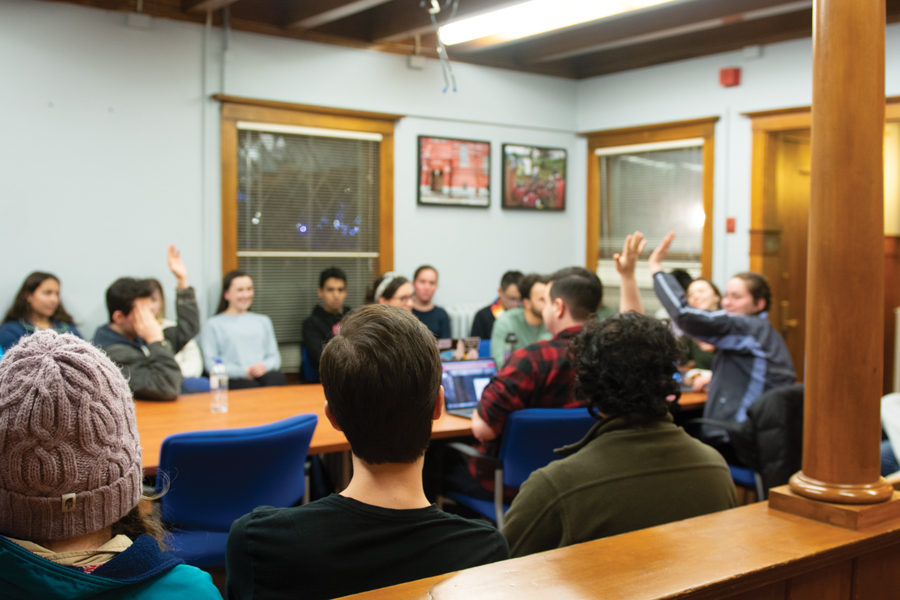Should the government bail out big businesses? Political Union discusses
Daily file photo by Caroline Megerian
Political Union at its Feb. 18 meeting, where a majority voted in favor of the resolution that the U.S. should implement free public college. Tonight, a majority voted that the U.S. should bail out big businesses in light of the COVID-19 pandemic.
May 4, 2020
In their virtual meeting Monday, Northwestern University Political Union members narrowly voted 6-5, with six abstentions, in favor of the resolution that the U.S. government should bail out big businesses in light of the COVID-19 pandemic. With a $500 billion corporate bailout included in the CARES Act, the issue has taken center stage in the news, causing substantial debate.
Proponents of the bailouts say they keep thousands of workers in their jobs and thus lead to greater stability. But others argue that the bailouts abuse the taxpayers’ money and allow big businesses to use the money recklessly.
Medill freshman Felix Beilin began by arguing bailouts are necessary for the economy’s strength.
“It’s better for the government to pay big businesses to not fire their employees, rather than let the companies collapse and then pay the workers directly in the aftermath,” Beilin said. “That’s because at some point, we will emerge from quarantine, and it’s better for employees to still have their jobs.”
However, Beilin said there have been problematic bailouts in the past, such as the Troubled Asset Relief Program in 2008. Congress had requested that banks lend money to consumers at higher rates, but it was later found that the banks benefiting from TARP actually lent at lower rates.
Beilin said these bailout failures serve as lessons from which to learn, so that there may be better bailout policies in the future.
“The lesson we learn is that it can’t be the treasury politely asking,” Beilin said. “Bailouts to big banks need to contain legislative provisions that force lending at higher rates when that’s a concern.”
Weinberg junior Eliana Buckner argued big business bailouts are not worth the money because they increase the chance of big businesses taking unnecessary risks without benefitting individual Americans.
“Instead of giving huge, costly bailouts with little oversight, we should let our systems of bankruptcy and insolvency work as intended,” Buckner said. “The best way to boost the economy is to put money in the pockets of Americans and to support small businesses.”
Buckner said bankruptcy allows companies to restructure while bailouts may prompt profit-driven companies to lay off workers.
The government should not bail out big businesses, Zalman Faltushanskiy, a first-year Feinberg graduate student, said, because demand will return after the crisis.
Bienen junior Sachin Shukla said the most compelling argument against bailouts for him is the moral hazard — the idea that a company protected from risk acts differently than it would without that protection.
Despite this concern, he said allowing for bankruptcy and disengaging workers from the workforce can be complicated.
“Work is important for social well-being beyond the income,” Shukla said. “It helps build social capital and improves mental health.”
Email: [email protected]
Twitter: @Rayna52637952
Related Stories:
— What does COVID-19 mean for the 2020 election? Political Union discusses
— Northwestern Political Union holds virtual debate over pass/fail grading
— Northwestern Political Union votes to support free U.S. public college












